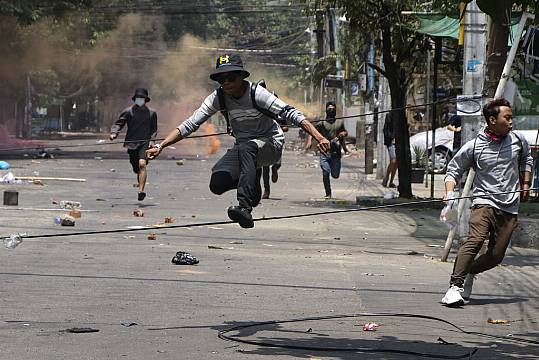The civilian death toll in the crackdown by the Myanmar junta has reached 550 since the February 1 coup, a human rights group has said.
Of those, 46 were children, according to Myanmar’s Assistance Association for Political Prisoners.
Some 2,751 people have been detained or sentenced, the group added.
Threats of lethal violence and arrests of protesters have failed to suppress daily demonstrations across Myanmar calling for the military to step down and reinstate the democratically elected government.

Late on Friday, armed plainclothes police took five people into custody after they spoke with a CNN reporter in a Yangon market, local media reported. The arrests occurred in three separate incidents.
Two women reportedly shouted for help as they were being arrested, Myanmar Now news service reported.
One police officer, who was carrying a gun, asked if “anyone dared to help them”, a witness told the news service.
“They pointed their pistols at everyone – at passers-by, and at people in the store,” a witness said of two police officers who forcibly took away two other women in the market.
Meanwhile, the Karen National Union representing the ethnic minority rebel group that has been fighting the government for decades condemned “non-stop bombings and air strikes” against villages and “unarmed civilians” in their homeland along the border with Thailand.

The group said in a statement: “The attacks have caused the death of many people including children and students, and the destruction of schools, residential homes, and villages. These terrorist acts are clearly a flagrant violation of local and international laws.”
In areas controlled by the Karen, more than a dozen civilians have been killed and around 20,000 displaced since March 27, according to the Free Burma Rangers, a relief agency operating in the region.
About 3,000 Karen fled to Thailand, but many returned under unclear circumstances.
Thai authorities said they went back voluntarily, but aid groups say they are not safe and many are hiding in the jungle and in caves on the Myanmar side of the border.
A five-year-old boy was amongst those killed by security forces on 27 March in #Myanmar. Military leaders must be held accountable for these atrocity crimes. The people of Myanmar must be protected. pic.twitter.com/yaYLM53DkM
— Amnesty International (@amnesty) March 30, 2021
More than a dozen minority groups have sought greater autonomy from the central government for decades, sometimes through armed struggle.
Several of the major groups – including the Kachin, the Karen and the Rakhine Arakan Army – have denounced the coup and said they will defend protesters in their territories.
On Friday, After weeks of overnight cut-offs of internet access, Myanmar’s military shut all links apart from those using fiberoptic cable, which was working at drastically reduced speeds.
Access to mobile networks and all wireless – the less costly options used by most people in the developing country – remains blocked on Saturday.
The coup reversed years of slow progress toward democracy in Myanmar, which for five decades languished under strict military rule that led to international isolation and sanctions.
As the generals loosened their grip, culminating in Aung San Suu Kyi’s rise to leadership in 2015 elections, the international community responded by lifting most sanctions and pouring investment into the country.







